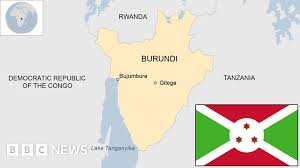Ok let’s move onto central and southern Africa and area that
includes Burundi, Chad, Central African Republic, South Africa, the Republic of
Congo, Rwanda, Zimbabwe and Namibia.
Let’s start with Burundi, officially the Republic of Burundi, it
is a landlocked country in the Great Rift Valley at the junction between the
African Great Lakes region and Southeast Africa, with population of over 14
million people.
It is considered by some to be
the poorest country in the world and is one of the least developed countries. Over 1
million of its people are facing crisis levels of hunger today. This is due to
poverty, climate shocks, soaring inflation and fuel shortages.
The town of Gitega, located in the central part of Burundi as the Political Capital, while Bujumbura, which is in the southwestern of the country, adjacent to the Lake Tanganyika is the Economic Capital.
Prior to 2019 Bujumbura served as Burundi's national capital,
but legislation passed that year designated Gitega as the country's
political capital and Bujumbura as the economic capital. The transfer of
government functions to Gitega proceeded in the following years.
The original flag was adopted after the country's independence
from Belgium on 1 July 1962. It went through several revisions and now consists
of a white saltire which divides the field into alternating red and green
areas. The centre of the saltire merges into a white disk, on which there are
three red solid six-pointed stars outlined in green. The current ratio is 3:5, which
was changed from 2:3 on 27 September 1982.
The franc is the currency of Burundi. It is nominally subdivided into 100 centimes, although coins have never been issued in centimes since Burundi began issuing its own currency.
Burundi's political system is that of a presidential representative democratic republic based upon a multi-party state. The president of Burundi is the head of state and head of government. The president is elected by absolute majority vote through a two round system. The supreme court is the highest court of the land. Judges are nominated by the judicial service commission and then appointed by the president with the approval of the senate.
Burundi has a diverse religious population, with the majority
identifying as Christian and a minority identifying as Muslim:
Christianity is the most common religion in Burundi, with about
three-fifths of the population identifying as Roman Catholic and more than
one-eighth identifying as Protestant.
Islam is a minority religion in Burundi, with Muslims making up
less than one-twentieth of the population. The majority of Muslims in
Burundi are Sunni, but there are also Shia and Ismaili communities.
A large minority of the population, including some Roman
Catholics, practice traditional religions.
The government of Burundi has granted tax waivers to religious
groups for the purchase of materials for development projects and for imported
religious items. The government has also provided opportunities for
religious leaders to preach about scriptures and moral issues.
This is another country that is not considered a safe
destination for tourists due to a number of risks, such as a threat of
terrorism, political violence, violent crime, including mugging, purse
snatching, pickpocketing, assault, carjacking, home invasion, grenade attacks,
and armed robbery and there is a risk of kidnapping for ransom, and criminals
have targeted foreigners in the past.
Not somewhere I would go.













Ive not heard of this country before. Thanks Jo-Anne
ReplyDeleteYou are welcome, I think there are many countries we may not have heard of
DeleteA friend of mine did a mission trip in Burundi just a few months ago.
ReplyDeleteThat's cool, any idea what they thought of the country
DeleteShe enjoyed the time there, just like anywhere she serves Christ. She loves working with the kids. But, pretty much she leaves the observations other than understandably there poverty to the imagination.
DeleteI had not heard of this country before, either. And never heard of a country having separate political and economic capitols. How strange! Not a place I would visit, either. Sounds quite dangerous!
ReplyDeleteYeah that two capitals thing is odd to me, I had heard of the country but knew nothing about it
DeleteSomewhere I too will not go, nor had I ever heard of it before today.
ReplyDeleteI kinda like it when I do a country not everyone has heard of
DeleteI wouldn't go there either, Jo-Anne.
ReplyDeleteThat's because smart people don't go to dangerous places
DeleteHow sad for the people who live there. It's good to see in person how other countries live, but that's a place I would not want to visit.
ReplyDeleteI agree with you on all points
DeleteThat would never be a destination of mine, Jo-Anne. Thanks for the lesson today!
ReplyDeleteI am pleased people liked the post, I think it would be crazy to visit there
Delete